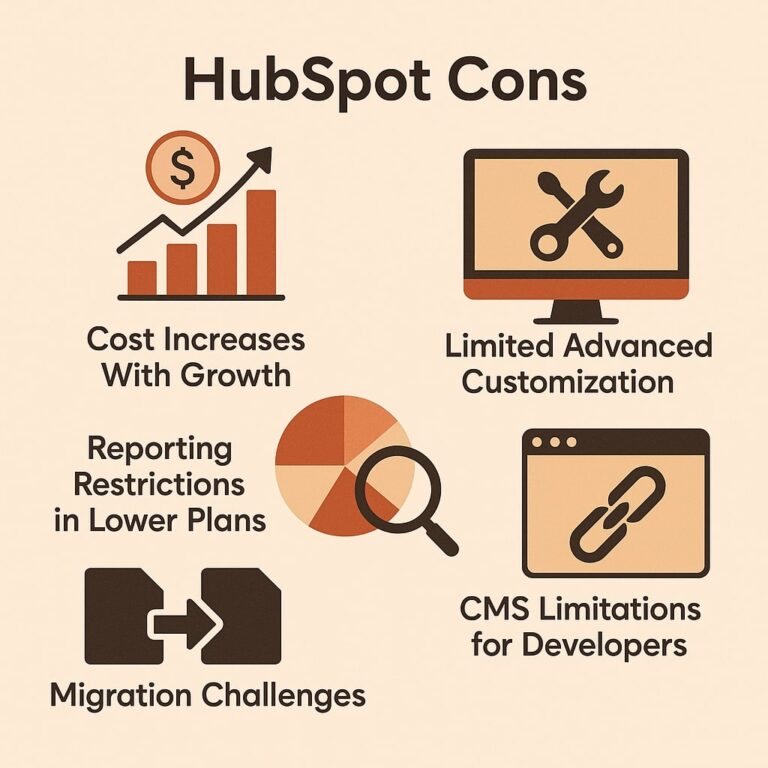HubSpot Pros and Cons: A Complete Guide for Businesses in 2025
Choosing the right platform to manage your marketing, sales, and service operations can feel overwhelming. HubSpot has emerged as one of the most widely adopted solutions, praised for its user-friendly design and powerful capabilities. But like any tool, it comes with both strengths and limitations.
As a trusted HubSpot agency with 15 years of consulting experience, we’ve guided businesses of all sizes through adoption, integration, and scaling challenges. In this article, we’ll provide a detailed breakdown of HubSpot pros and cons, including insights into HubSpot CRM pros and cons and HubSpot CMS pros and cons, so you can make an informed decision.
Why Businesses Choose HubSpot
HubSpot is more than just a CRM; it’s an ecosystem designed to align marketing, sales, and service teams. Its all-in-one structure appeals to organizations looking for a unified platform without managing multiple disconnected tools.
From free CRM capabilities to advanced marketing automation and a fully featured CMS, HubSpot aims to simplify operations while enhancing customer engagement. However, businesses must weigh their benefits against potential drawbacks to determine if it aligns with their goals and budget.
HubSpot Pros
1. User-Friendly CRM
HubSpot’s CRM is known for its intuitive interface, making it easy for teams with little technical expertise to adopt quickly. Contact management, deal pipelines, and reporting dashboards are straightforward to configure.
2. All-in-One Platform
HubSpot consolidates marketing, sales, and service tools under one roof. This integration reduces the complexity of juggling multiple platforms and helps teams work from a single source of truth.
3. Extensive Automation Capabilities
Workflows in HubSpot automate repetitive tasks like lead nurturing, deal assignments, and ticket routing. This frees up time for sales and marketing teams to focus on high-value activities.
4. Educational Resources and Support
HubSpot Academy and knowledge base resources are widely regarded as some of the best in the industry. Users can quickly learn how to maximize the platform without relying heavily on third-party training.
5. Customizable CMS
For content-driven businesses, HubSpot CMS offers drag-and-drop functionality, built-in SEO tools, and adaptive testing, making it a strong option for marketers without technical backgrounds.

HubSpot Cons
1. Cost Increases With Growth
While HubSpot offers a free CRM, costs can escalate significantly as you scale into paid Marketing Hub, Sales Hub, or Service Hub tiers. Companies often find advanced features locked behind higher pricing.
2. Limited Advanced Customization
HubSpot is designed for ease of use, but this simplicity can frustrate businesses that require deep customization. More complex workflows, data structures, or integrations may need custom development.
3. Reporting Restrictions in Lower Plans
While HubSpot’s dashboards are user-friendly, advanced reporting often requires higher subscription levels. Smaller businesses on Starter plans may find reporting limited.
4. CMS Limitations for Developers
Although HubSpot CMS is designed for marketers, developers may find it restrictive compared to open-source alternatives like WordPress, especially for highly complex websites.
5. Migration Challenges
Switching to HubSpot from another CRM or CMS can be complex. Data migration, integrations, and staff training require careful planning and expert guidance.

HubSpot CMS Pros and Cons
Pros of HubSpot CMS
-
Built-in SEO recommendations
-
Drag-and-drop editing with no coding required
-
Personalization features based on contact data
-
Tight integration with CRM for smarter content strategies
Cons of HubSpot CMS
-
Higher cost compared to some CMS options
-
A restricted plugin ecosystem compared to WordPress
-
Developers may encounter limitations with advanced customization
Who Should Use HubSpot?
HubSpot is an excellent choice for SMBs and mid-market companies that want to unify marketing, sales, and service on one platform. Businesses that prioritize ease of use, rapid adoption, and access to educational resources often find it to be a great fit.
However, enterprises with highly complex customization needs or those seeking a low-cost solution with deep developer flexibility may need to evaluate alternatives or prepare for additional investment.
How to Maximize HubSpot Value
To fully benefit from HubSpot, businesses should:
-
Work with an experienced HubSpot company for implementation and optimization
-
Clearly map out workflows and reporting needs before upgrading plans
-
Leverage HubSpot Academy for ongoing staff training
-
Regularly audit tools and integrations to avoid redundancy
Conclusion
Understanding the HubSpot pros and cons is essential for businesses weighing their CRM and CMS options. While it excels at providing an all-in-one, user-friendly platform, it does come with cost and customization trade-offs.
For organizations considering HubSpot, partnering with a certified HubSpot company ensures smooth implementation, better adoption, and long-term ROI. At Mpire Solutions, we’ve spent 15 years helping businesses harness HubSpot to streamline processes and improve customer engagement.
FAQs
1. Is HubSpot CRM really free?
Yes, HubSpot CRM is free with unlimited users, but advanced sales and reporting features require paid upgrades.
2. What are the biggest advantages of HubSpot CMS?
HubSpot CMS integrates directly with the CRM, offering marketers SEO tools, personalization, and simple editing features.
3. What is the main drawback of HubSpot?
The primary drawback is cost escalation, as advanced features are available only in higher subscription tiers.
4. Is HubSpot better for small or large businesses?
HubSpot is often best for small to mid-sized businesses. Larger enterprises may require deeper customization and integrations.
5. How does HubSpot compare to WordPress for CMS?
HubSpot CMS is more marketer-friendly and integrated with CRM, while WordPress offers greater flexibility for developers at a lower upfront cost.
Relevant Guide
HubSpot Discount Code 2025 – Save More on Plans
Creating HubSpot Secret API in Secret Name: A Complete Guide
Drupal Developer In Boston | Ways to Find the Best 1!
Drupal Web Development Firm | Helpful Tips to Use while Hiring 1!
Circle.so HubSpot Integration Services
QuickBooks HubSpot integration Services
AirCall HubSpot Integration Services
 HubSpot Consulting Needs
HubSpot Consulting Needs  Custom Automation Plan
Custom Automation Plan 







